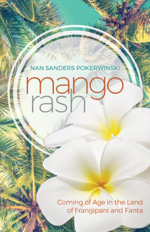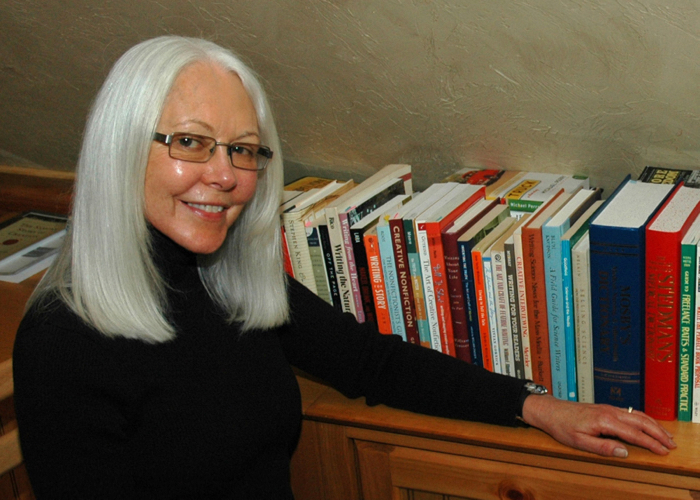by Nan Sanders Pokerwinski
The memoir Mango Rash centers on one pivotal year in my life,
when I lived on a tropical island as a teenager.
That one year made such an impression on me and left me with such a sense of longing, I could never get it out of my mind and heart.
Yet when people asked about the experience, I struggled to give anything but the most superficial answers: “Oh, it was beautiful,” or “It was a great place to be a teenager.”
There was so much more than that to the story.
Finally, some 40 years afterward, I joined my first writers’ group and needed to generate work to share with the other writers. I started writing this memoir, and the members of the group kept wanting to read more . . . and more . . . and more . . . so I kept going.
The Pitfalls in Telling a Story Chronologically
In a long work like this, structure and theme are the biggest challenges for me.
I knew the beginning and ending, because I framed the story in the span of a single year, from my arrival on the island to my departure eleven months later. And I told the story chronologically, so it wasn’t hard to figure out the order.
But the pitfall in telling a story chronologically is that it can turn into an episodic recitation of “and then . . . and then . . . and then . . .”
I wanted to develop themes running through the narrative, and I had to spend quite a lot of time in revision, teasing out and tying together those themes.
Life Got in the Way, and I Had to Set the Manuscript Aside
There was a period, after the first draft was finished, when life got in the way, and I had to set the manuscript aside for a few years.
It was frustrating not to be moving ahead with it. I didn’t completely abandon the project, though. I kept workshopping chapters in writers’ groups and at conferences, and I filed away all the feedback for the day I would be able to get back to work on the manuscript.
When that day finally came, I was able to jump back in and move forward again.
Bigger emotional challenges came when I finished revisions and started trying to get Mango Rash published. As it is for many authors, it was a long process with many “almosts.”
I did struggle with self-doubt at times, but I kept getting enough positive feedback to feel it was worth pushing on.
Writing About My Past Gave Me New Insights Into My Own Actions
I’m not sure there was one big moment of triumph while writing this book, but there were many little moments when I found something that seemed to fit perfectly.
I integrated a lot of Samoan proverbs and legends into the story, as well as song lyrics, and snippets from such authors as Somerset Maugham and Robert Louis Stevenson.
Discovering just the right one for a particular chapter felt like (pardon the obvious Stevenson reference) digging up treasure.
I worked a lot on craft while writing this book, and as a result, I feel stronger as a writer. Writing about a meaningful period of my past also put me in touch with the person I was then and gave me new insights into my own and other people’s actions and motivations.
Writing NonFiction Feels Like Work, While Fiction Feels Like Play
I wouldn’t say that writing memoir is a spiritual practice—at least not usually.
Journaling and what little poetry writing I do feel more spiritual. Because I wrote for living (as a journalist) for so long, writing nonfiction feels more like work, while writing fiction—which I’ve recently started exploring—feels like play.
You Never Truly Lose What You’ve Fully Loved and Experienced
There are three things I hope readers take away from the book, and they’re all related.
First of all, that we can learn so much from cultures other than our own, if we open ourselves up to what they have to offer.
Second, that change is inevitable, but it’s wise to consider what kinds of change are beneficial and growth-promoting and what kinds only lead to destruction and loss.
Finally, that it’s worth loving something you may lose and embracing experiences that may be fleeting, because you never truly lose what you’ve fully loved and experienced—you carry their essence with you forever.
As for why we need to be reminded of these messages, on the first point, there is just so much mistrust and misunderstanding among different groups of people these days. Yet when diverse people have opportunities to interact, and they go into the experience with open hearts and minds, they always come away enriched.
On the other two points, we all tend to either resist change entirely or to forge ahead just for the sake of change, without considering the long-term consequences. Neither is the best path.
Advice for Other Writers: Take Your Time
Take your time—in writing, in revising, in pursuing publication.
It’ll seem like it’s taking forever, but the more time you invest, the happier you’ll be with the final result. In the process, glean as much information as you can from other authors. Learn from their mistakes and successes, and listen to their advice (even if you don’t take it all).
One bit of advice that’s definitely worth taking is something I heard in a workshop—I believe it was from Chuck Sambuchino: “aim to be the rule, not the exception.”
Sure, we’ve all heard the smashing success stories: the author who got her dream agent on the first try; the one whose book sold at auction for beaucoup bucks. But far more authors labor long and hard before their dreams come to fruition.
Expect to put in the time and effort. Be pleasantly surprised if doors open magically for you, but don’t go in expecting that to happen.
* * *
Nan Sanders Pokerwinski held the position of science writer at the Detroit Free Press for more than a decade, after which she worked as a science writer for the University of Michigan News Service for fourteen years. In her freelance work, she has been a contributing editor to Health and Alternative Medicine magazines and has written for More, Fitness, Dallas Morning News, and other print and online publications. (Her journalistic work carries the byline Nancy Ross-Flanigan).
A national engineering society once awarded her first place in their writing contest for a piece on potholes. Her work has garnered other awards—from groups as diverse as the Magazine Association of the Southeast and the American Motorcyclist Association—and a Pulitzer nomination.
Mango Rash won first place in the memoir/nonfiction category of the 2018 Pacific Northwest Writers Association literary awards. In addition, excerpts were finalists for the 2015 and 2017 Tucson Festival of Books Literary Awards, the 2015 Northern Colorado Writers Top of the Mountain Book Award, and the 2017 New Millennium Writings Literary Awards, and have been published in Colere.
When she’s not writing, Nan take photographs, makes collages, and wanders the woods around the West Michigan home she shares with her husband Ray Pokerwinski.
For more information on Nan and her work, please see her website, or conect with her on Facebook and Twitter.
 Mango Rash: Coming of Age in the Land of Frangipani and Fanta: Sanders trades cruising Main Street in search of tater tots for strolling sandy shores with islanders who feast on sea worms and summon sharks with song.
Mango Rash: Coming of Age in the Land of Frangipani and Fanta: Sanders trades cruising Main Street in search of tater tots for strolling sandy shores with islanders who feast on sea worms and summon sharks with song.
With a dash of teenage sass, Mango Rash chronicles Nancy’s search for adventure—and identity—in two alien realms: the tricky terrain of adolescence and the remote U.S. territory of American Samoa. Against a backdrop of lava-rimmed beaches, frangipani-laced air, and sensual music, Nancy immerses herself in 1960s island culture with a colorful cast of Samoan and American expat kids.
But life is not one big beach party, Nancy soon finds, when she clashes with her parents over forbidden boys and discovers double standards in the expat community. Samoa, too, is experiencing growing pains as ancient customs collide with 20th-century ways. In the midst of all this, a hurricane shatters the peaceful paradise, delivering lessons in attachment and loss, strength and survival.
Like Nancy, readers of this unforgettable memoir will fall in love with Samoa’s biscuit-tin drum serenades, its mountains like mounds of cut velvet cushions, and its open-hearted people, who face adversity with grace. And just as Nancy does when her own health crisis thrusts her into a very different kind of unfamiliar territory, readers will draw strength from fa’a Samoa: the Samoan Way.
In language as lush as the island landscape, Mango Rash enchants, entertains, and, ultimately, inspires with its message about embracing and learning from other cultures.
Available at Amazon, Barnes & Noble, and IndieBound.

